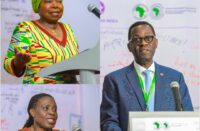 As the country recently added another year to its age, experts examine the journey so far. Their aggregate position points to an era with little or nothing to cheer, ADEMOLA ALAWIYE writes
As the country recently added another year to its age, experts examine the journey so far. Their aggregate position points to an era with little or nothing to cheer, ADEMOLA ALAWIYE writes
The Federal Government appears to have been insistent that the economy has been growing, despite arguments from the citizenry that this is not being felt by the common man.
Amidst the two opposing views, apalling statistics underscoring the level of underdevelopment continue to show that the standard of living is growing worse than it was 30 or 52 years ago.
There is no doubt that Nigeria is endowed with enormous human and natural resources, which if efficiently harnessed and managed, has the potential to ensure that Nigeria’s economy becomes one of the strongest in the world.
According to some analysts, corruption is the only problem of Nigeria. To them, Nigeria,a country with a promising future in 1960, did not endure much after independence before the hope began to thin away. The reason, they say, was that corruption became a famous citizen immediately after independence. Today,it has enthroned itself as king in the differrnt facets of the nation’s life.
Figures from the National Bureau of Statistics show that the structure of the Nigerian economy has remained largely the same since the 1970s. The three dominant sectors and their shares of Gross Domestic Product are- agriculture (40 per cent); wholesale and retail trade (20 per cent) and crude petroleum (15 per cent). Solid minerals sector (0.4 per cent) remains insignificant.
The primary sectors and trading constitute 75 per cent of our national output, and also account for 99 per cent of exports. The so-called ‘modern sectors’ – manufacturing (four per cent); telecoms and post (5.7 per cent); finance and insurance (3.5 per cent); building and construction two per cent); real estate (two per cent); and hotel and restaurant (0.5 per cent)â€â€Âall account for just 18 per cent. These are the sectors in which one would expect innovation and high value-adding jobs to occur.
The Managing Director, Sotice Investment Company Limited, Mr. Adedayo Toluwase, says Nigeria faces growing economic decline and falling living standards, a reflection of political instability, corruption, and poor macroeconomic management, which is mostly noticeabkle in the failure to diversify the economy.
“The manufacturing sector is largely comatose and declined from a share of seven per cent of GDP in 1970s to four per cent currently. Our manufacturers are fighting a losing battle against the armada of imports from cheaper and more productive locations abroad. Nigeria’s export of manufacturing is still less than one per cent after more than 50 years of attempts at industrialisation whereas all our comparable countries such as Indonesia have more than 40 per cent,†he says.
The Chief Executive Officer, Fatrax Securities Company Limited, Dr. Wale Ositelu,notes that the major problems of the country have had to revolve around bad leadership.
He says, “Anyhow you want to see it, bad leadership is our major problem. Corruption has eaten deep into the minds of Nigerian leaders to the extent that leaders do not think of what they want to offer but what they want to amass from the country’s resources. It’s disheartening that people even steal what they cannot finish spending. This has brought a lot of hardship on Nigerians, unemployment is increasing, poverty is rising, there’s no peace and order. All these leave you wondering whether there has been any flicker of hope over the last 52 years.
“Asian countries, such as Singapore and Malaysia, with similar colonial heritage and attributes attendant thereto, and similar natural resource endowments, have recorded significant successes in the development of their economies since 1965 when they were at par or even behind Nigeria. Singapore, some 30 years later, had a per capita income of some US $10,000; whilst that of Nigeria was US $300. Nigeria’s economic decline, especially during the last 20 years is illustrated by the fact that per capita income, which was $1000 in 1965 had declined to US $300 by 1998. Within some 18 years, Nigeria had declined from being a low middle income country and amongst the fifty richest countries in the world to one of the 30 poorest.â€ÂÂ
The Deputy Manager, Civic Investment Limited, Mr. Thomas Adenuga, says the major causes of the decline in Nigeria’s economic fortunes had been political instability and bad governance, most especially in the 1990s.
The economist adds that leadership problem that had confronted Nigeria since independence appears to be worsening because the state of the polity is rapidly deteriorating.
“Very few of the leaders, if any, work for common good. Over the years, a wave reform programs have been undertaken but the society lacks political leadership committed to implementing them to address the problems facing the economy. Thus leadership is a responsibility,†he adds.
Although corruption is a global scourge, he argues that Nigeria appears to suffer the most from it because the leaders are pathologically corrupt.
He says, “Everyone appears to believe that the nation has a culture of corruption. Over the years, Nigeria has earned huge sum of money from crude oil, which has gone down the sinkhole created by corruption. This money is supposed to be used to build the economy but people have shared it as if it belonged to their families alone. So how do you expect the economy to grow?â€ÂÂ
President Goodluck Jonathan, last Monday, called on Nigerians to be steadfast in the march towards national development, notwithstanding the myriad of problems confronting the country.
The president, in a nationwide broadcast to mark Nigeria’s 52nd independence anniversary, said despite the determined efforts of his administration to make life better for the people, the nation faces many challenges that were hampering its progress.
He listed the challenges to include security, flooding, corruption and the economy, all of which he said his administration was working assiduously to address
He said, “Those challenges should not deter us. In the last few weeks, for example, many of our communities have been ravaged by floods, resulting in the loss of lives and property, and the displacement of persons. I want to reassure all affected Nigerians that I share in their grief, and our administration is taking steps to address these incidents, in collaboration with the states and local governments.
“I have received the interim report of the presidential team that I set up to assess the flood situation across the country. The Federal Government has taken measures to assist the affected states, while considering long-term measures to check future recurrence. We must continue to work together, confidently and faithfully, to ensure that our country’s potential is realised to the fullest; that our dreams are translated into reality; and that our goals are achieved.â€ÂÂ
Source: Punch






